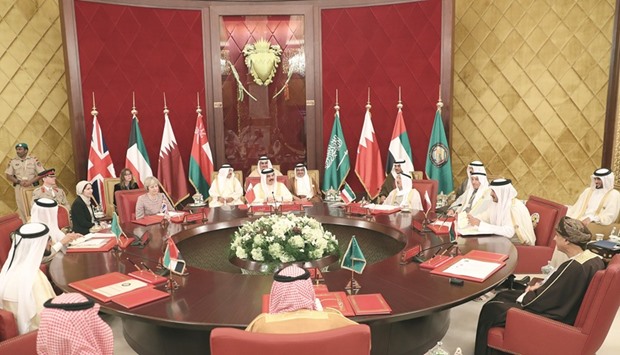Britain plans to deepen security co-operation with Gulf Arab countries and work with them to counter Iranian actions in the region, Prime Minister Theresa May said yesterday.
Addressing a meeting on the sidelines of the Gulf Co-operation Council Summit in Bahrain, May said Britain would invest more than £3bn in defence spending in the region over the next decade.
“Gulf security is our security,” May said.
Britain is trying to build on traditionally strong ties with Gulf Arab states before its planned departure from the European Union.
In a joint communique, the two sides said they intended to build on trade between Britain and the Gulf Cooperation Council (GCC) states, which stood at £30bn in 2015.
“We will make it a priority, when the UK leaves the European Union, to build the closest possible commercial and economic relationship,” the statement said.
This included working to remove barriers to trade and investment.
The joint communique also said the GCC states and Britain would work together to counter what they called “Iran’s destabilising activities”.
Gulf Arab states say Iran is trying to expand its influence in Arab countries, including Syria and Yemen.
Since March last year, Saudi Arabia and other Arab allies have been fighting a war against Iran-aligned Houthi forces that had seized control of Yemen.
The two sides also pledged to enhance defence co-operation, including efforts to defeat Islamic State and in maritime and cyber security through their new Strategic Partnership.
The statement stressed that regional conflicts can only be resolved through diplomacy.
The statement said Britain and GCC countries were “committed to continue working towards a sustainable political resolution in Syria”, where President Bashar al-Assad “has lost all legitimacy and has no role in Syria’s future.”
It called for Assad’s backers including Russia and Iran “to support a meaningful end to the violence, sustained humanitarian access and an inclusive political process” in Syria.
May was the first woman and first British leader to address a GCC summit, as Gulf countries deepen ties with major powers beyond longtime ally the United States.
In May last year, France’s President Francois Hollande became the first Western head of state to attend a GCC summit.
US President Barack Obama followed in April this year, seeking to reassure Gulf leaders about US overtures to Iran.
GCC leaders have expressed concern over the international agreement that lifted sanctions on Iran this year in exchange for guarantees it would not pursue a nuclear weapons capability.

HH the Emir Sheikh Tamim bin Hamad al-Thani and other GCC leaders with British Prime Minister Theresa May at the summit in Manama yesterday.
